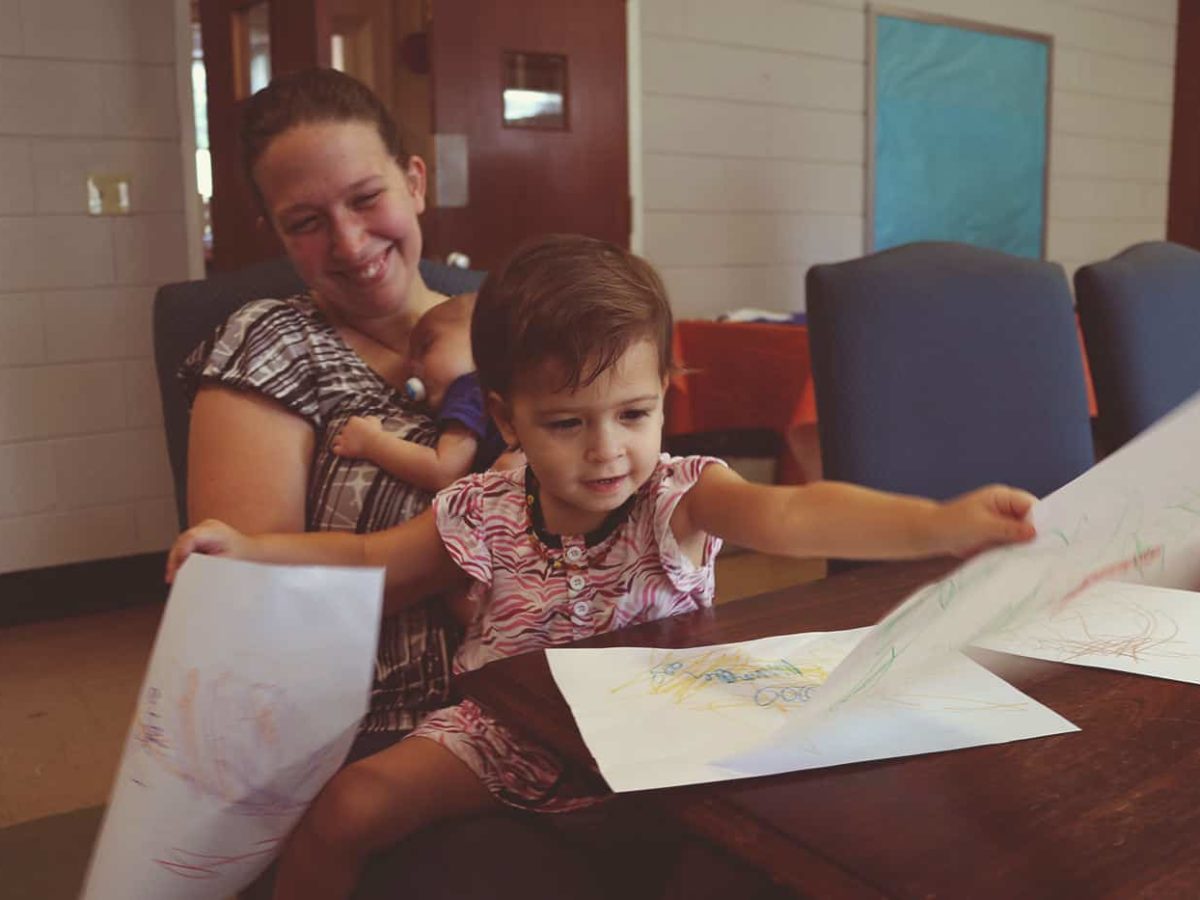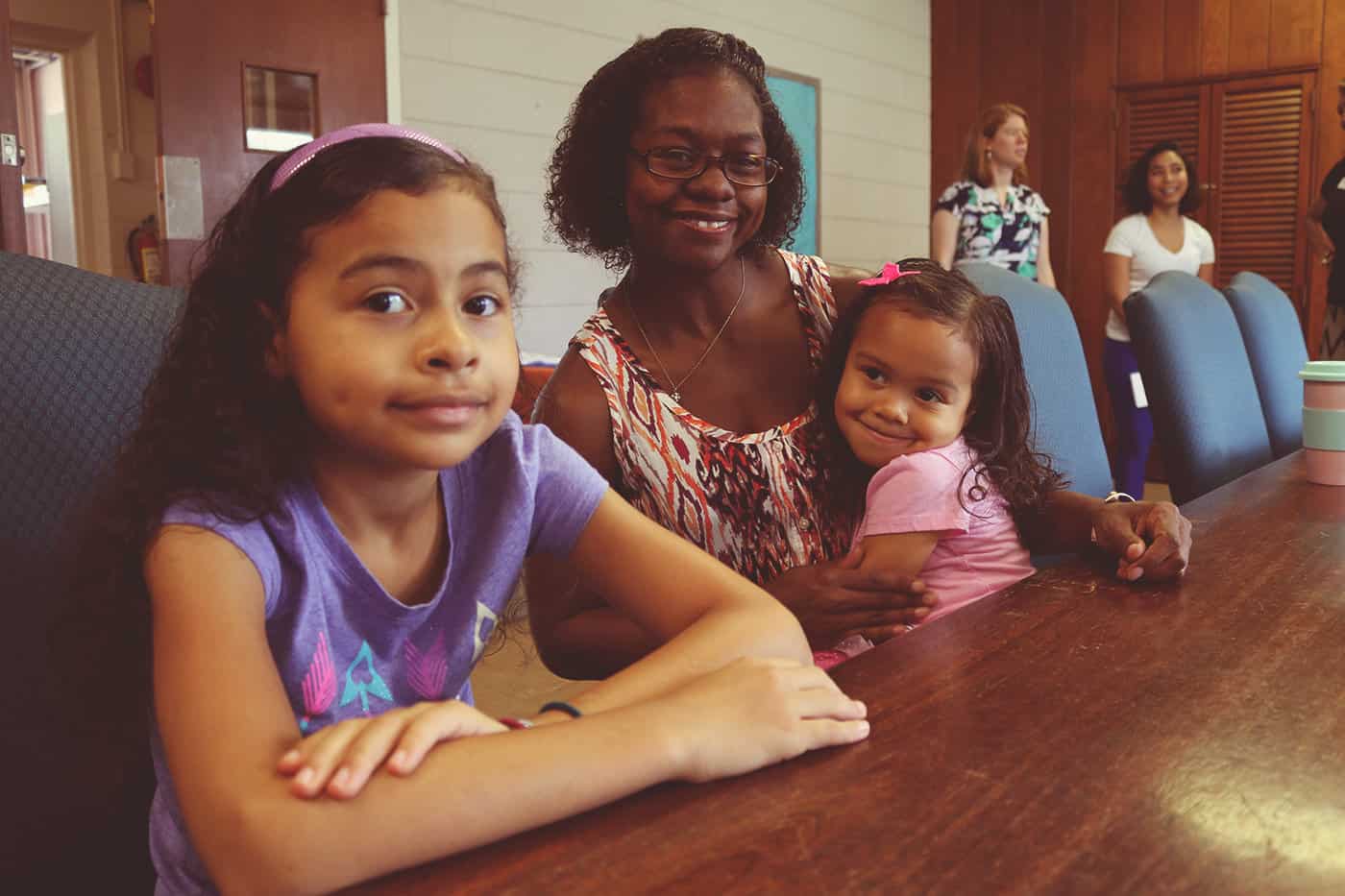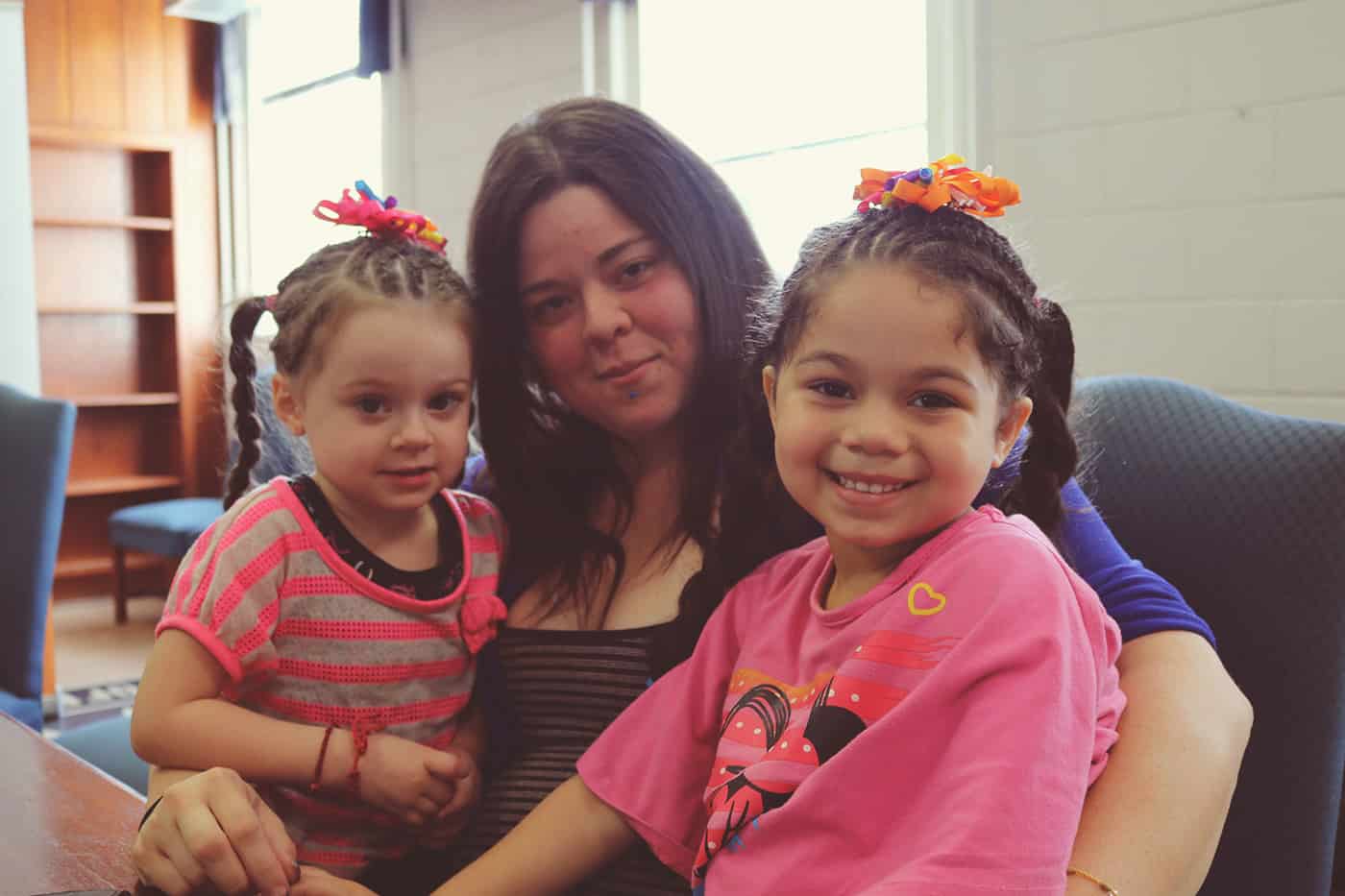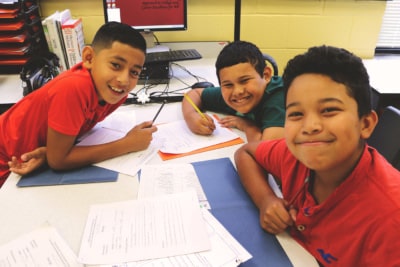
If you were driving down Broad Street in Winston-Salem, it would be easy to pass the Augsburg Community Center and not notice. At first glance, it looks like any of the many houses of worship that populate the city and the surrounding county.
However, the old church building is now a new gathering spot for another type of community building, and several local nonprofits now call the old church grounds home.
One of those is an organization called Imprints Cares, a long-standing community institution that is leading the way in an innovative approach to parent engagement and early childhood education.
Imprints Cares mission is to “enrich children’s development while supporting their families on the journey of parenthood.” Since 1969, Imprints Cares has focused on helping the children of Winston-Salem be better prepared for school and to assist their parents in being the best possible caregivers and educators for their children.
Imprints Cares works with parents considered high-risk, who meet any number of criteria for inclusion into the program. This might include parents who are receiving medicaid, single parents, teen parents, recent immigrants, or victims of abuse. They reach those parents through partnerships with local pediatric practices, including Wake Forest Baptist Health System’s Downtown Health Clinic in Winston-Salem.
https://youtu.be/xvQabsppoKM
By co-locating family educators at the practices, Imprints Cares is able to supplement the care given to children and the support provided to their parents.
“We feel like we have developed a relationship over time [with the Downtown Health Clinic],” said Byers. “The director, Robert Jones, has let us be on site there, and over time I feel we have proven to be a really good partner.”
https://youtu.be/6QRXggOfJos
By co-locating their services within large pediatric practices, the organization gains parents’ trust when a doctor can recommend one of their family educators who is located onsite, just down the hall.
“Parents consider their pediatricians to be the foremost expert,” Byers said. “So it was a great entry point for us, because in a way it gives us validity because they already trust their pediatrician.”
The co-located model also benefits the clinics where they are located. Physicians, who often see dozens of patients in a single day, can refer parents to the on-site Imprints Cares staff person for a more in-depth visitation.
“We have a complementary set of information to give the parents, and we also can spend more time talking about sleep issues or discipline issues, whereas the physician is more focused on the physical health,” Byers said. “That’s one of the things we have seen over the period that we have been there, is what a great partnership we are and how we can more effectively serve the families together. And I think we have really garnered a lot of respect from the pediatricians. We feel real proud of that.”
“They see hundreds of patients a day, and they only get to see them for 10-15 minutes each,” said Jenna Delgado, an Imprints Care family educator. Delgado points out that visits to pediatricians are more frequent in the first year of a child’s life, but typically only occur once a year afterward. That makes it easy for some children to fall through the cracks and for certain developmental delays to be missed.
“When the doctor is going through their checklist, asking ‘Do you think anything is wrong? Do you think they are talking well? Do you think they see well?’ The parents, lots of time, don’t know any better because they are first-time parents and they don’t have anything to compare it to.”
New parents may not be able to notice the signs of delay and may not communicate those concerns to their child’s doctor.
“And then they don’t get the help that they need,” Delgado said.
“If the doctors notice something, they will refer them to us. And then we do the developmental evaluations to see if they are where they should be. And if the parent is interested, we do the home visitations.”
In addition to the co-location of services at the Downtown Health Clinic, Imprints Cares also works with the Winston East Pediatrics and Westgate Pediatrics to co-locate services.
But those are not the only way families can get help.
“We will take referrals from any avenue,” Byers said. Imprints Cares gets referrals from a variety of local agencies and nonprofits, including the Department of Social Services, the school system, and Amos Cottage, a local nonprofit that assists children with developmental delays.
The Imprints Cares model also differs from other child and family support programs by the range of ages it serves.
“Many services here [in Winston-Salem] may serve birth to two,” Byers said. “For instance, Nurse Family Partnership serves children birth to two, but we serve birth to five. So oftentimes, when they graduate from Nurse Family Partnership, they would be referred to us.”
“And many programs in the community work with children birth to three,” Byers said. ‘There seems to be a scarcity of resources from ages three to five. So we are able to fill that in terms of parenting. We are able to be that parenting support [for those ages.] We do get a lot of referrals when programs stop at three or two.”
“We’ve finally been around long enough that I think we are being recognized as that premier agency on parenting education and support,” Byers said.

The service the organization provides to families extends beyond the walls of the pediatric practice. Once a family has been referred to the co-located representative, they are asked if they would be interested in working with a family education consultant to set up ongoing home visits. These visits are a deep dive into practices to better prepare a parent’s child for the start of school and to give parents the skills they need to nurture their child’s development.
“How we really help the families is with our intensive home visitations,” Byers said. “That is the focus of our work with the parents of children birth to five.”
“We find the home is the most effective place to work with parents.”
https://youtu.be/3_s9NdkJ2lg
“They all the sudden start seeing parenting as this real job and this real role,” said Byers. “And they become very empowered to be these leaders in their own families. That’s what we love to see happen.”
It is through a strong, ongoing relationship with their family educator that parents learn the skills they need to be the best parent they can be.
“When we go there [to the home], we bring developmental information that is age appropriate for the child in the home,” said Mita Lambe, who has worked as a family educator at Imprints Cares for more than 10 years. “We do an activity when we go there. During the activity we interact with the child and with the parent. We model doing the activity and encourage the family to continue doing that activity during the next two weeks.”
The organization’s family educators meet with their families twice a month, and though they come prepared and focused on helping the child reach his or her developmental milestones, they also adapt their support to whatever the parent or child might need at any given visit.
“We meet them where they are,” Lambe said. “If there is an issue, then we adjust, and we talk and listen to that parent, and help them with whatever that issue is.”
“I have 20 families that I serve, and each day I have between two and four home visits, depending upon the availability of the families,” said Family Educator Jenna Delgado. “I plan the home visit depending upon the number of kids and the milestones they are at and their developmental domain.”
Delgado sees her role as being a support not only for the child but for the parents as well.
“At each visit we talk about the family, how they are doing, because not only are we working with them to help with their development of their children, we are also a support system for the parents,” Delgado said. “And a lot of these families have no support from even their own families. So [we are] someone to help them figure out how to reenroll in school, or stay motivated to keep working at a job they don’t like, just telling them that they are doing a good job and being a good mother.”
One of the most important lessons the family educators try to instill in their parents are the benefits of active reading with a child. At each visit, educators bring books and will remind parents of how important it is to read to their children as early and frequently as possible.
“A lot of the time, the families I work with [the parents] are high-school dropouts, or they themselves don’t read very much, and when they are reading they aren’t really engaging or interacting with the kids,” Delgado said.
The family educators take time to model for parents how to interact with a child when reading a book.
“I’m sitting on the floor with the kids, getting excited, asking them questions, asking them about the pictures,” Delgado said. “If I can tell they are not really engaged in the story or if they are getting bored, I will make something up that will get them excited.”
But at the core of all the activities, and at the heart of the family educator message, is active and ongoing parent involvement and interaction with their child.
“We also do a parent/child interaction activity,” Delgado said. “In that activity, we are working in one of the developmental domains, like fine motor skills, language, cognitive, social, or emotional, and whichever one we do, we focus on that. For example, I was working with a child who didn’t have good fine motor skills. We would practice cutting, playing with play dough, practice drawing, and I would bring those activities based on where their delays are.”
The educators adjust which activities and materials they bring to a visit based on where the child is at in her developmental domain. That might mean materials to help with reading or playing games that help with language or that even strengthen the muscles in the mouth.
But whatever the excercise, it involves both the parent and the child.
“We do the activities together [with the parents], and bring handouts about the research behind it,” Delgado said.
The materials are a resource the parents can use, giving step-by-step instructions on how to practice with their child the activity the educator modeled for them at the visit.
“I always tell them it’s their homework to do the activity everyday until our next visit, so they will keep practicing and keep building those skills,” Delgado said.
The family educators are sensitive to the challenges their parents are facing outside the home that might tax their ability to be the parents they aspire to be.
“They have such big goals and they want to do so much, and they want to turn their lives around for their children,” Delgado said. “[But] they drop out of school, and they are working more than 40 hours a week in a minimum-wage job, and they just can’t make ends meet, and they want to go to school. It’s really hard for them to go to school. And even if they are going online or at night, [it’s difficult] to stay committed and motivated. And when they get home at night, they are tired and have to take care of a kid who they haven’t see all day. So they are acting out. It’s hard.”
Delgado says a lot of the parents she serves works more than one job. And many are single parents and very young. She says most of the families she works with are under the age of 20.

Ask anyone at Imprints Cares and they will tell you their parents only want what’s best for their children. However, the day-to-day demands of meeting basic needs while balancing school or multiple jobs can mean less time for quality parent-child interaction.
“Most the families we work with are in the high-risk category,” Lambe said. “They are parents that have to work different shifts; two jobs sometimes. So time is a big obstacle.”
The family educators work with their parents to help them find time in the day to sit down and read with their child. They reinforce the long-lasting benefits that even small increments of positive interaction can have on a child’s development.
“We try to help them give that time — just 15 minutes with a child to play with them, to read with them. To start that interaction, and that communication at that early age,” Lambe said.
“We all as parents want to do the best for our children,” Lambe said. “I think the families we serve also want to be the best parents, but they may not have the tools, and that’s when we bring information for them to use. It is as simple as playing with [the child], but some [parents] don’t realize that playing with the child is preparing them for school. Just to come and remind, to reinforce, to empower [parents] that just by playing with [their child], by reading to them, by talking with them, they are preparing their child for school.”
And sometimes the best support is just a reminder that they are in fact good parents. It’s the emotional support they may not receive elsewhere.
“A lot of times they are already doing that, but they don’t feel that they are good enough,” Lambe said.
https://youtu.be/WI8SHfSShiQ
Monica: “My family educator is like a friend.”
“I became aware of Imprints Cares at a prenatal checkup at the Downtown Health Plaza,”said Monica Douglas, a mother of two. “I saw a flier, and I wanted to get to know a group of moms that were pregnant like me. I was three months pregnant with my youngest, and my oldest was in preschool. So I actually got help on both sides of the spectrum, with prenatal health and early childhood health. I called them and then set up a visit. My family educator is like a friend.”
Douglas appreciates the extra lengths her family educator goes to support her family’s needs. Even though Douglas is a trained early childhood educator, she still finds herself learning new things.
“One of the things I like is she sets goals for me as an individual and then for my child,” Douglas said. “We go over the developmental stages for the child for each developmental milestone. And my background is early childhood, so being able to see that makes me feel a little more at ease as a parent knowing that I am doing what I am suppose to be doing as a parent. It lets me know what I need to work on at home with her.”
Douglas has seen the impact the home visitations have had on her children.
“For my oldest, they did her testing for readiness,” Douglas said. “She’s been highly academically gifted since kindergarten.”
Her youngest has been tested as well and is considered ready for kindergarten at age three.
“I can look at that and it makes me feel good as a parent that I am doing what I am suppose to be doing,” Douglas said. “And they could see that, and if I weren’t [doing what I should be doing], they would get me help.”
Though health issues currently prevent her from working in the childhood field, she finds the interaction with the Imprints Cares team is a way to keep her updated on her early childhood training.
“It’s like a refresher course. Book knowledge is not the same as hands-on knowledge. I read things about parenting but until you are a parent…it’s totally different,” Douglas said with a laugh. “Being a part of Imprints Cares has made me feel more secure as a parent.”
Melissa: “My parent educator was my doula.”
Melissa Hall learned about Imprints Cares while attending a Pregnant in the Piedmont event after the birth of her first child. She got a contact at the organization and reached out to learn more about the home visitation program.
“When I talked to the person, I thought this is perfect. This is exactly what I want for my daughter,” Hall said. “So I put her in the program.”
For Hall, the positive results of her ongoing partnership with the Imprints Cares team have been clear.
“My daughter is one of the smartest kids I have ever met, and I strongly believe it has to do with the books and how they push reading to your kids, and all the activities that my parent educators have really focused on. It’s just amazing,” Hall said. “I’ve recommended this program to everybody.”
For Hall, the home visits reinforced the importance of practices she was already doing with her children but also provided the background on why those activities were important and how she might be able to do them even better.
“I did [know to read to my child], but I didn’t know how important it was,” Hall said. “There’s one activity we did with [her daughter], and they said it would help with fine motor skills. And there’s other things that helped with language development. Just learning the different things and the different activities and how they would help your kid has really helped me to be a better mom. You never understand how to teach kids until you become a mom and someone tells you.”
When she had her second child, Hall was determined to put into practice the things she had learned with her daughter and to carry on her partnership with her family educator and the Imprints Cares team.
“We usually meet at my apartment,” Hall said. “Mary, my parent educator is really good about asking questions. ‘Is there anything that is worrying you?’ Like with his development, since he’s so little and he’s hitting so many milestones so quickly, so if there’s something bugging me, we talk about that. If we need any resources for anything, we’ll talk about that. And then we’ll focus on activities that will help with development in whatever stage your kid is in. So the activities for my daughter are different than my [son]. She brings us books that are age appropriate. She brought me potty training books for my daughter because that’s what we are going through with her. She brought me the cute little baby books…for my son. ”
The bond she formed with her family educator while working with her first child carried over to her second. “My parent educator was my doula,” Hall said with a laugh.
Minerva: “They help us with whatever we need, for ourselves and our kids.”
“Where I took my daughters to doctors, they referred me to Imprints Cares,” said Minerva Rivera, a mother of two who has been working with Imprints Cares since January. “They have helped us a lot, especially my oldest. She didn’t know her numbers, her ABC’s. They helped put everything together. ”
Rivera says her children enjoy the parent support group meetings that take place at the Imprints Cares offices. It’s a chance for families to gather and meet other parents. To create a support network of peers and to have a space for their children to play and meet new friends.
The girls look forward to the visits, to the events that they have,” Rivera said. “They interact with other kids [when they come to the office]. They look forward to meeting new people, to playing games.”
For Rivera, the most recent Imprints Cares client I interviewed, the benefits of the program were immediate, both for her and her daughters. “I am learning more,” Rivera said. “With the group meeting and seeing other parents that are getting the same help we are, it makes me more at ease. [To know] that if she is falling behind, we get the help that she needs before moving on.”
“They help us with whatever we need, for ourselves and our kids also.”
The parent support groups are an aspect of the Imprints Cares program that has grown over time and is now considered a vital part of the overall family education program.
“We feel like over time that’s gotten to be just a stronger component,” Byers said.
Byers notes that the organization had a recent parent support group meeting with 18 parents in attendance and close to 40 children.
“That’s what regularly happens,” Byers said. “The children play together. The parents work together. ”

Last year, Imprints Cares home visitation program reached 224 children in the county from 1,690 visits. The organization provided more than 1,600 books. The organization also has after-school and summer camp programs that serve 13 schools in the community and reach another 1,000 school-age children. They also offer a fee-based tutoring program. The tutoring and the after-school/summer programs are revenue generating programs that help support the organization’s service to low-income and high-risk families in the community.
But Byers and her team know their work is only scratching the surface and that the need in the community is great.
Of the families served by Imprints Cares, 98 percent were considered low-income and 56 percent had a low level of educational attainment. More than 90 percent of their families were considered high-need.
“Close to 50 percent of children in Forsyth County show up to school not ready,” Byers said. “And that’s the devastating statistic, because it’s children who show up to school not ready who tend to stay behind.”
“This is thousands of children that we are dealing with.”
https://youtu.be/xSLNyqmS8rE
A lot has changed for Imprints Cares since it was launched in 1969. As with any organization that has been around for that length of time, there have been ups and downs. A downsizing in state funding a few years back forced the organization into a period of contraction, but as the saying goes, necessity is the mother of invention, and Byers’ and her team began to reimagine the work of the organization and how it might expand in coming years.
Byers now feels the organization is on more firmer footing and is excited at the possibilities of expanding its role in the community and being a part of the collaborative spirit evolving in Forsyth County.
“We have just begun doing work with the United Way doing what we are calling placed-base work, working as collaboratives in neighborhoods,” Byers said. “We have one collaborative called Strong at Home, and it is a partnership with Family Services, Habitat for Humanity, Financial Pathways, and Goodwill. We will work with Head Start families but also families in another neighborhood in Winston-Salem, the Boston-Thurman neighborhood. That’s exciting to me, to think about bringing all these services around families in a neighborhood setting.”
Byers is inspired by the collective interest in the place-based model and hopes the spirit of collaboration will continue to grow.
“I would like to develop those really strong partnerships, because all of us in this community know it’s never one agency, one program that can do it alone,” Byers said. “And I think we have some wonderful programs here in the community that are bringing some really great collaboratives together, and I would like to see that grow.”
https://youtu.be/QmYwtx5oriw
Having been with the organization for 10 years, Family Educator Mita Lambe now runs into families who have graduated from the program and whose children are in the school system.
“It’s exciting,” Lambe said. “To see them in the store, and they are so eager to share with us how our program helped them and prepared them for school, and that they are doing great at school.”
For Family Educator Jenna Delgado, who is one of the newest staff members at Imprints Cares, the rewarding moments of her work are more immediate.
Delgado describes one family she began working with where the four-year-old child could not draw a person, couldn’t use scissors, and did not know her alphabet. Her mother was concerned there was something wrong with her daughter, given a family history of mental illness and physical abuse. However, Delgado was able to rule out any health or mental issues with the child, and together with the mother, they began the hard work of addressing the child’s delays.
In about six months, the child could draw at an age-appropriate level and can now use scissors.
“She’s basically ready for kindergarten,” Delgado said. “It’s so awesome. We did another evaluation for the second year, and I was talking to her mother, and I was like, ‘Can you tell the progress?’ She didn’t even know the ABC song when we started.”
Delgado is quick to point out that the effort was a partnership.
“Her mom took the time and realized what she had to do. [Before] they watched a lot of television, and [her children] just played with their dolls by themselves. She wasn’t really interacting with them. Now we are practicing our alphabet and our letters.”
That’s one more child who is ready for school and one more empowered parent in the community.


